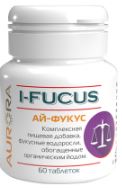In Russia, the average iodine intake is 40-80 micrograms per day, with the recommended rate of 150-200 micrograms, which is 2-3 times lower than the physiological needs. For comparison, a US resident receives 400-800 micrograms of iodine per day, and a Japanese resident receives about 1500 micrograms per day or more.
According to the Ministry of health of the Russian Federation, up to 70% of Russians experience a lack of iodine in the body to some extent. So, the average Muscovite consumes from 40 to 80 micrograms of iodine per day instead of the norm of 100-150 micrograms.
The main reservoir of iodine in nature is the world ocean. In the course of the Earth’s evolution, more iodine was washed away from the soil surface by glaciers, snow, and rain, and carried away by wind and rivers to the sea. Therefore, this trace element is concentrated in the seas, oceans and underground waters. The land surface and fresh water were depleted of iodine.
Fucus is a genus of brown algae. Seaweed fucus is also called “sea grapes”, “sea oak”, such names were formed because of the external similarity. Fucus is a one-and-a-half-meter ribbon of yellow-green or light brown color with “branches” that are strewn with a mass of paired air bubbles. The composition of fucus algae includes vitamins: A, B1, B2, B3, B12, C, D,E and others. Minerals: potassium, calcium, magnesium, zinc, sulfur, iodine, phosphorus, iron, selenium, barium and about 30 different micro – and macronutrients.
When choosing an iodine-containing drug, it is important to pay attention to which compound contains iodine. To prevent the body from experiencing additional stress during the assimilation of foreign compounds, a group of Russian scientists has created an innovative product with high bioavailability of organic iodine – marine iodine from fucus, the technology of which is protected by a patent. We enriched fucus with organic iodine obtained by enzymatic iodization of amino acid residues of cow’s milk whey proteins, followed by additional purification from inorganic iodine by ultrafiltration, as well as freeze-drying or spray drying.
In it, the most important chemical element is contained in a naturally digestible form for humans, in the form of sea fucus and iodine compounds with whey, similar to natural compounds that a child receives from mother’s milk, and an adult — from plant and animal products, including cow’s milk. The unique structure of the covalent bond of iodine atoms with whey milk protein allows you to regulate the balance of iodine in the human body, i.e. to get exactly as much of this trace element as it needs, and the “excess” can be safely removed through the kidneys.
The “storage” of iodine in our body, as well as the “producer” of iodine-containing hormones (thyroxine, triiodothyronine) is the thyroid gland. Iodine regulates metabolism and stimulates the immune system cells. We consume no more than one teaspoon of iodine from the outside during our entire life, but a deficiency of this trace element – depending on the level of deficiency – can cause irritability, rapid fatigue, sweating, headaches, sudden weight changes, memory loss, problems with the cardiovascular and respiratory systems. A special group is pregnant and nursing mothers: they need almost twice as much iodine as an ordinary adult.
Lack of iodine provokes miscarriages, stillbirths, increases the risk that the child will be born with abnormalities. The fetus does not have its own thyroid gland until 16 weeks, but literally from the first days of life, the embryo needs its mother’s hormone – thyroxine. Otherwise, there may be problems with the development of vision and hearing. Severe iodine deficiency is fraught with mental retardation of the baby. Although even a slight degree of iodine deficiency leads to the fact that the child’s IQ level will be 10-15 points lower than that of peers from regions that are safe in terms of iodine. Most often we are talking about an IQ below 100, absent – mindedness, attention deficit, inhibition-thus, the lack of iodine can play a bad joke with the future performance of the child in school and in General with his success.
“Sea iodine” is recommended as a source of iodine in organic form to reduce the risk of developing iodine deficiency and related diseases. It is known that when using drugs containing inorganic forms of iodine (potassium iodine), there is an overabundance of iodine and the so-called “overdose” associated with the accumulation of iodine in the thyroid gland, which significantly worsens its work. And this is a significant difference between iodine – containing drugs.
Sea iodine also has a unique effect on the human body:
- removes heavy metals and radionuclides,
- normalizes digestive and metabolic processes,
- normalizes cholesterol in the blood, prevents the formation of blood clots,
- prevents diseases of the heart, thyroid, nervous system, and diabetes.
Composition of 1 tablet: fucus algae enriched with organic iodine 150 mcg.
Recommendations for use: take 1 tablet 2 times a day with meals.
Contraindications: individual intolerance to product components.
release Form: 60 tablets, weighing 300 mg.
nutritional value per 100 g of product: protein – 5 g, fat – 0.6 g, carbohydrates – 9 g.
Energy value per 100 g of product: 62 kcal / 260 kJ.
storage conditions: in a dry place, protected from light, at a temperature of +5 °C to +25 °C and relative humidity of no more than 75%.
expiration date: 2 years from the date of manufacture.
It is not a medical-preventive or specialized food.







 Русский
Русский Deutsch
Deutsch
Reviews
There are no reviews yet.